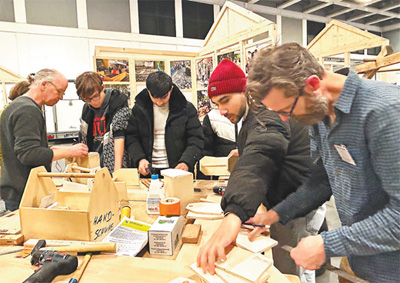On January 28, the International Green Week Berlin (IGW) 2024 concluded in Berlin, Germany. As one of the world’s largest exhibitions for food, agriculture and horticulture, IGW 2024 drew more than 1,400 exhibitors from 61 countries and regions, attracting roughly 300,000 visitors. Concurrently, the Global Forum for Food and Agriculture (GFFA) was held, where delegates discussed sustainable land management, among other topics, aiming at halving food waste by 2030.

(At the first-ever “Experience Centre for the Young Generation” at the IGW, several young people are making wooden household items under the guidance of professionals.)
Smart agriculture and low-carbon agriculture are a highlight of this year’s exhibition. At the booth named “AI·Land”, Franco, the head, showcased their latest product to the reporters, which is a robot designed for crop cultivation throughout the entire life cycle. This robot can deal with individual plants based on their specific conditions, resulting in a 20% reduction in water usage for irrigation. To address the potential obstruction of ground lighting caused by static solar panels, this photovoltaic robot can move on the track as needed, thereby minimizing shading.
Franco told the reporter that after obtaining his PhD in engineering from FH Aachen-University of Applied Sciences in Germany two years ago, he co-founded a “Tech +” farm with his brother, who is engaged in agricultural production, using technology to empower agriculture. Today, his farm has a team of 15 engineers dedicated to developing the necessary hardware and software required for agricultural automation. “This robot, a product that we have developed successfully, can efficiently automate crop cultivation,” he said.
The application scenarios for “Sci-Tech+Agriculture” are becoming increasingly diverse, unleashing the potential of agricultural productivity. An exhibitor displayed a fully automated seeding and weeding robot equipped with solar panels, which is capable of operating for 24 straight hours. Meanwhile, an agricultural machinery company presented a climate-friendly tractor powered by electricity, which can operate continuously for five hours and boasts advantages such as low energy consumption and zero emission.
During the event, the organizer also held various forms of experiential activities to promote the concept of sustainable development to visitors. In the exhibition area of the German Federal Ministry for the Environment, Nature Conservation, Nuclear Safety and Consumer Protection, visitors could put on virtual reality glasses to experience the “marsh world” in 360 degrees and understand the importance of marshes to ecological balance. In the forestry exhibition area, people could explore the fascinating relationship between forests and the water cycle. In the area of the German Federal Ministry of Food and Agriculture, people could learn how to reduce their carbon footprint and emissions when cooking.
For the first time, the IGW established an “Experience Center for the Young Generation”, based on the country’s dual system, a vocational education and training program, enabling teenagers to experience 90 types of professions. At the center, many local primary and secondary school students were experiencing different jobs with great enthusiasm. Viktor, a ninth-grade student from Robert Jungk High School in Berlin, told the reporter, “I’m very interested in jobs related to nature and land. I operated a farm machine here and worked as a gardener for a while. It was very interesting.” At a woodcraft workshop, several young people made wooden daily goods under the guidance of professionals and did a very good job. “We hope that through hands-on experiences, youngsters can learn more about jobs related to green living and be inspired to protect the environment with their own actions,” a staff member of the Center told the reporter.
At the exhibition venue, people could engage in interactive projects, or listen to forums centered around themes such as climate neutrality and circular economy. They could also exchange views with agricultural and technological experts from around the world. The concept of green development has thus been seamlessly integrated into people’s day-to-day lives.


